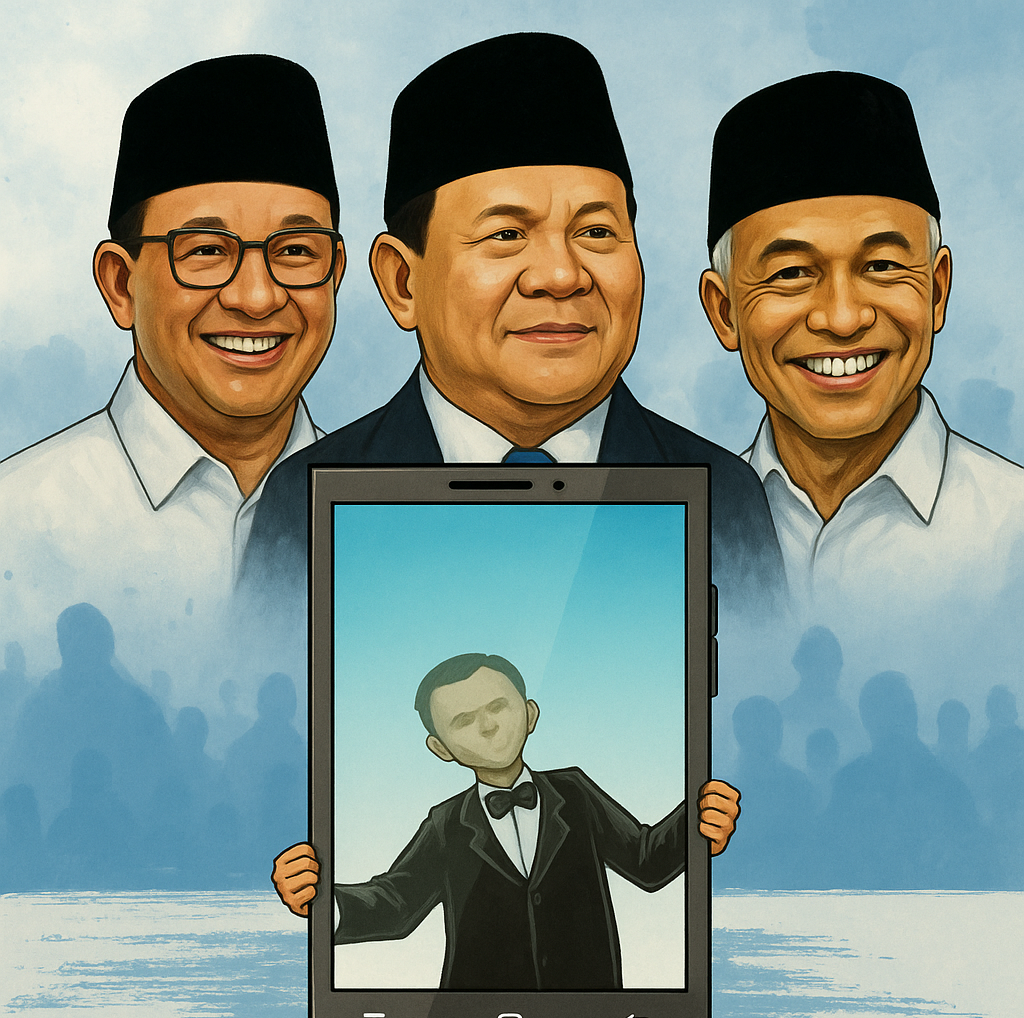Political Gimmicks on Social Media in the 2024 Presidential Election and Criticism of Democratic Practices in Indonesia
Gimik Politik di Media Sosial Pada Pilpres 2024 dan Kritik Terhadap Praktik Demokrasi di Indonesia
Keywords:
Gimik Politik, Pilpres 2024, Komunikasi Politik, DemokrasiAbstract
The contestation of presidential elections in Indonesia is inseparable from the evolving political dynamics, including the 2024 election, which was marked by the widespread use of political gimmicks. All presidential and vice-presidential candidates employed light, casual, and entertaining communication strategies rather than conveying their visions, missions, and policy programs substantively. This phenomenon poses a risk of diminishing the quality of democracy, as political contests tend to favor candidates who can emotionally engage the public rather than those who offer concrete solutions to national issues. This study aims to examine the impact of political gimmicks on the quality of political communication and to propose strategic responses to this trend. A qualitative descriptive approach was employed through a literature review, utilizing sources from scholarly articles and online news platforms. The findings indicate that political gimmicks were predominantly targeted at young voters, who constituted the majority demographic in the 2024 election, making them an effective yet risky campaign tool. Political gimmicks have been shown to obscure political substance, erode democratic values, and hinder the development of a civil society. Therefore, concrete measures are necessary, such as strengthening public political education, utilizing social media as a platform for idea-based contestation, and fostering a collective commitment among candidates, voters, and state institutions to build ethical, transformative, and welfare-oriented political communication.
References
Budi Sulistijanto, A. (2022). Implementasi Gaya Komunikasi Joko Widodo dalam Berpolitik. LITERATUS, 4(2). https://doi.org/10.37010/lit.v4i2.805
Cindy Mutia Annur. (2024, March 1). Ini Media Sosial Paling Banyak Digunakan di Indonesia Awal 2024. Databoks
Dinansyah, F., Faramita, A., & Putri, V. K. A. (2019). Persepsi Milenial terhadap Gaya Pendekatan Kampanye Politik Kandidat Capres-Cawapres 2019. Comnews , 15–20.
Firman Noor. (2022, March 5). Indikator Kualitas Demokrasi Kita. Kompas.Id, 1–1.
Fitria Chusna Farisa. (2023, November 1). Belanja Iklan Pendukung Prabowo di Medsos Rp 8,67 Miliar, Tertinggi Dibanding Pendukung Ganjar dan Anies. Kompas.Com.
Habibi, M., Muksin, N. N., Kurniawan, D., & Perdanaraya, A. (2022). Komunikasi Politik Kepala Daerah di Media Sosial (Studi pada Akun Facebook Anies Baswedan, Ridwan Kamil dan Ganjar Pranowo). Potret Pemikiran, 26(2), 164. https://doi.org/10.30984/pp.v26i2.2059
Hafied Cangara. (2018). Komunikasi Politik Konsep, Teori dan Strategi (Edisi Revisi).
Iqbal Basyari, K. Y. R. N. H. (2023, December 3). Kampanye Mendidik, Bukan Sekadar Gimik. Kompas.Id, 1–1.
Iqbal Basyari, P. D. S. (2023, December 20). Laporan Dana Kampanye Capres-Cawapres Belum Sesuai Realitas. Kompas.Id, 1–1.
Nabilah Muhamad. (2023a, July 5). KPU: Pemilih Pemilu 2024 Didominasi oleh Kelompok Gen Z dan Milenial. Databoks.
Nabilah Muhamad. (2023b, November 14). Ini Media Sosial yang Dipakai Anak Muda untuk Akses Informasi Politik. Databoks.
R Siti Zuhro. (2024, February 14). Pemilu 2024 dan Kepemimpinan Nasional. Kompas.Id, 1–1
Ritonga, A. D. (2020). Mencermati Populisme Prabowo Sebagai Bentuk Gaya Diskursif Saat Kampanye Politik Pada Pemilihan Presiden 2019. Politeia: Jurnal Ilmu Politik, 12(1). https://doi.org/10.32734/politeia.v12i1.3170
Shilvina Widi. (2023, February 3). Pengguna Media Sosial di Indonesia Sebanyak 167 Juta pada 2023. Dataindonesia.Id.
Sugeng Winarno. (2023, December 5). Akhiri Gimik Politik. 1–1.

Downloads
Published
How to Cite
License
Copyright (c) 2025 Felisianus Novandri Rahmat

This work is licensed under a Creative Commons Attribution 4.0 International License.





